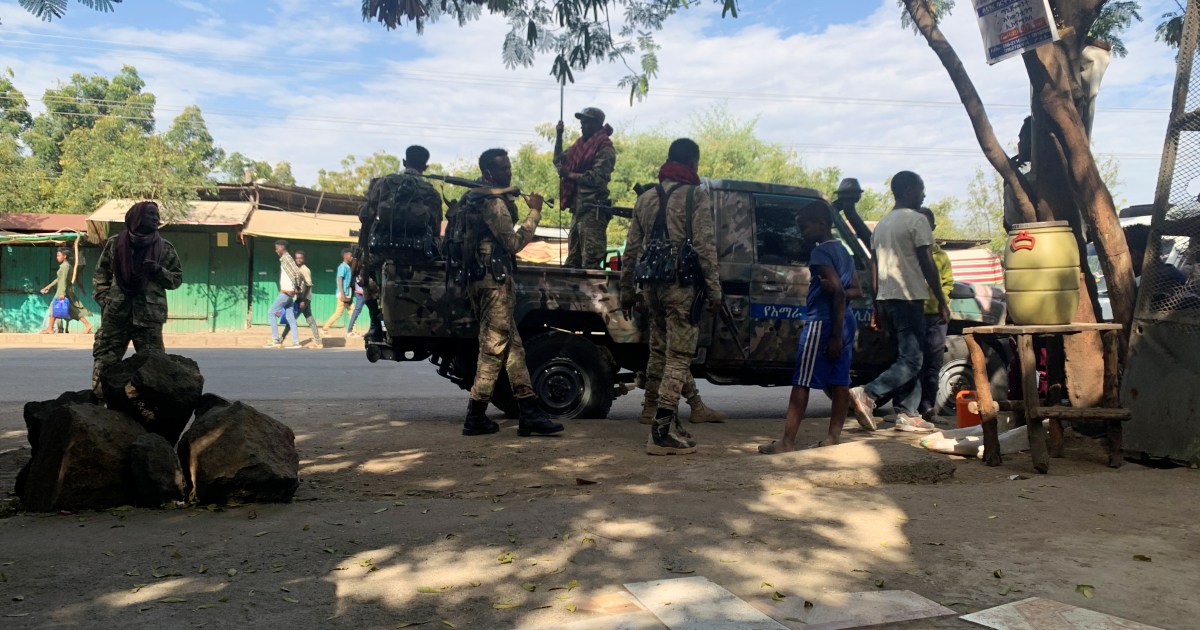Reuters reported that two explosions occurred in two cities in the state of Amhara in northern Ethiopia, while Ethiopian Prime Minister Abiy Ahmed called on the forces of the Tigray People's Liberation Front to surrender within two days to the National Army forces, to save their lives and protect the safety of the region.
Ethiopian sources reported hearing the sound of two explosions that rocked the cities of Bahr Dar and Gonder in the Amhara region (north), late Friday.
A source told Anadolu Agency in Bahr Dar - who preferred to remain anonymous - that the sounds of exchanges of fire were heard after the explosion in the city.
The communications office said investigations had been launched to determine whether the blasts were linked to the fighting in Tigray.
Today, Saturday, the Ethiopian government said a missile was fired at two cities in Amhara State, which borders the northern Tigray region, where the government is fighting local forces.
A UN warning
On Friday, the United Nations expressed its fears of war crimes in the ongoing battles between the Ethiopian army and the Tigrayan Liberation Front, and the United States condemned a "massacre" against civilians.
On Friday, the United Nations said that fighting between Ethiopian government forces and rebel leaders in the north could spin out of control, and that war crimes may have been committed as the effects of the conflict spill over into the troubled Horn of Africa.
The United Nations High Commissioner for Human Rights, Michelle Bachelet, spoke of "the possibility of this situation getting out of control."
And she added - in a statement - that if it is confirmed that a party committed a massacre against civilians reported by Amnesty International's reports, "it would amount to war crimes."
The 10-day conflict in Tigray province has killed hundreds and caused a wave of displacement towards neighboring countries.
Field gains
The Ethiopian army confirmed its continued advance and control of many areas within the region, and its liquidation of what it called enclaves of the rebel forces.
The conflict began last week when Prime Minister Abiy Ahmed said the Popular Front for the Liberation of Tigrayans had attacked a military base, and since then federal forces have launched an air and ground offensive that the government says has resulted in the liberation of western Tigray.
It was reported that Ethiopia was withdrawing thousands of its operating forces in Somalia.
Ahmed - a member of the Oromo, the largest ethnic group in the country - announced that Parliament had appointed Molo Nega, 52, as president of the Tigray region, a former professor at Addis Ababa University and deputy minister of science and higher education.
"He will choose the CEO and appoint the heads of the executive bodies of the region from among the political parties that operate legally there," Ahmed wrote on Twitter, calling on the Tigrayans to surrender.
Treason and rebellion
It is noteworthy that the dismissed ruler and leader of the Popular Front, Debarsion Gabr Mikael, is facing official charges, along with other officials in the front, of treason, armed rebellion and terrorism.
Gabr accused Mikael, the prime minister, of committing a dangerous precedent in the history of Ethiopia and its rulers "by using a foreigner" against his people, indicating that the ongoing war is a war of extermination against the people of the region.
For its part, the African Union announced - on Friday - the dismissal of Commissioner for Peace and Security Gabr Djaziaber Mebratu, an Ethiopian citizen, after his country's government accused him of disloyalty.
This came after a letter sent by the Ethiopian Ministry of Defense two days ago, in which it expressed concerns about his loyalties.
Sudan asylum
More than 14,500 refugees, half of them children, have arrived in Sudan since the start of the fighting in Ethiopia 10 days ago.
Aid agencies said the situation in Tigray was getting more difficult, and that there were also fears of a mass displacement of thousands of Eritrean refugees in a camp in Ethiopia.
The authorities in the Sudanese border state of Gedaref estimate the number of refugees who have arrived at more than 6 thousand, in light of extremely difficult humanitarian conditions.
The governor of Gedaref issued a distress call to the Sudanese government and the international community to stand with his mandate, in light of expectations that the number of refugees would rise to more than 20,000, which exceeds the state's ability.
American evacuation
In a related context, the US embassy in Ethiopia revealed, on Friday, its efforts to evacuate its citizens from the city of Maqli, the capital of the Tigray region, after the military confrontations between the federal government and the regional forces.
The US embassy asked its citizens to contact it by all available means, and called on all Americans to inform their relatives of American citizenship holders who are in Tigray, and "it will take the necessary measures to evacuate them."
There are more than a thousand people of various nationalities stranded in the area.

